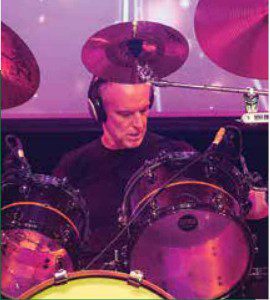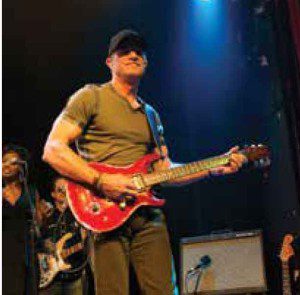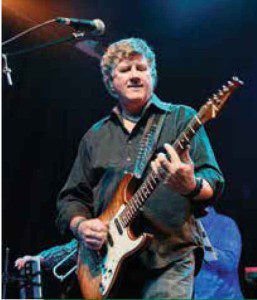The Moderators’ four founding members are all business leaders: Mike Fries, the band’s lead singer, is the CEO of Liberty Global, the world’s largest international cable TV operator. Drummer Bob Deibel is president of Denver-based OfficeScapes, a workspace furniture provider. Guitarist Ed Haselden is CEO and chairman of Haselden Construction, a 400-employee building contractor based in Centennial, Colorado, while guitarist Bryant Martin is CEO of a Bella Vida, a Denver-based construction distributer and real estate development company that operates in
Costa Rica.

The group got its start back in 2006 when the core four met as part of Denver’s Young Presidents Organization (YPO) and decided to form a rock band for what was supposed to be a one-time performance at an upcoming YPO event. “We got together as a favor to the event’s planner and rehearsed a few songs,” recalls Haselden. “We came to enjoy [playing], and received such a resounding response at the show that we thought we’d try to keep going.”
The band began rehearsing regularly in Deibel’s basement (much to the chagrin of Deibel’s wife); but as things started coming together, they moved their gear into a roomier “garage” where the noise wouldn’t bother anyone and the space was more in keeping with their day jobs: Haselden’s airport hangar. After eight months of woodshedding (going off to practice), the Moderators played their next gig; and from that moment on, they’ve been on fire. They’ve built a strong reputation and a large fan base throughout the Rocky Mountain region as a top cover band, and they’re showing no signs of slowing down.
Today, the band is very selective about where it performs, choosing elite, large-capacity venues rather than slumming it on the typical bar-band circuit with the other cover bands in the area. Another thing that makes them different from all of the other cover bands is that aside from paying lighting engineers and roadies to haul their equipment, the band donates all of its revenue to charity. “Early on, we produced a show at a local music venue with 1,000-people capacity, lined up a few sponsors, charged $10 a person and raised $30,000, which we then gave to a local school program,” says Haselden. “The next year, we did one, got the Mile High United Way involved and made over $100,000 for charity.”

This past November, the band was backed by a gospel choir at Denver’s Gothic Theater and raised more than $200,000, but that’s still small in comparison to the types of gigs they’ve been doing of late. “Last year, we played the Fillmore Auditorium in Denver, which holds 3,700 people,” recalls Haselden. “It was an annual gala event; and as the showcase performer, our band played 18 songs with the Colorado Symphony backing us up, and we raised $1 million for charity.”
As you might imagine, the band’s charitable mission has been rewarding for all of its members. “Many of us are actively involved in the community outside of the band, but it’s been very gratifying to see the band become a highly visible platform for community engagement,” says Deibel. “The band is far more interesting to other people than any of the other avenues of community involvement I might be doing.
“Despite my best efforts otherwise, the local business community sees me as [a] stiff corporate guy; so when they realize I’m also the drummer in the Moderators, it gives them a chuckle.” Bands are notorious hotbeds for dysfunction; so being in an artistic venture with so many other Type A personalities, where no one is in charge, has helped teach each of the Moderators’ founders new ways to channel their own leadership skills.
“Being in the Moderators isn’t something that’s given me a balance in my corporate life,” explains Deibel. “It’s informed it as an extension of it.” Bryant Martin readily admits that what keeps the band dynamic interesting is that nearly half of its members occupy the corner offices at their respective day jobs. “In most work situations I’m in, I’m the decision maker,” he says. “I do what I want, how I want, when I want. But that doesn’t work in a band.” Deibel concurs, referring to the band as one would talk about a compelling business school case study or a successful lab experiment. “It’s been interesting to see our leadership styles blend,” he says. “We’ve become pretty effective at melding our collaborative and decision styles.”

“It took us a while to settle into this,” says Deibel, “but I have been impressed by the vision some of the other members have had to help us evolve. Being in this band has really taught me some things about the value of thinking big. I would not have envisioned the path this band has taken, and I wouldn’t have had [the] grand vision to think as big as some of my co-founders have done.”
“I’ve had to realize that it’s not just about me,” says Haselden, “which is sometimes hard for a CEO to get over. I’ve had to learn patience and how to become more collaborative with the entire band. There are 12 people involved, and everyone’s playing their own part in each of our songs. When you’ve got all that going on, the performance can get muddied up quickly, so you have to create space for all the parts. That collaborative process is what we should be applying in business.
“My day-to-day style is more like that of an autocratic dictator,” he adds, “but it’s become apparent to me that patience and collaboration are really important. All the other guys are as strong-headed as I am; and if we don’t set aside our egos to do what works best for [the] band, we won’t succeed.

Singer Mike Fries, who cites “chutzpah” as his biggest influence as lead singer for The Moderators, runs a global company with 36,000 employees and is not one to shy away from being in charge, but he has no problem sharing leadership responsibilities in The Moderators. “Great CEOs understand that collaborating is just as important as calling the shots,” he says, “And we’ve divided up the chores so that everyone’s chief of something.”
Is there a downside to so many CEOs sublimating their egos? “We could use a few rules,” admits Fries, noting that without a spandex-clad prima donna barking out orders, everyone’s left to make their own decisions.
While the band isn’t suffering as a result, some areas of their act might benefit from a change-management program. “Choreography and wardrobe are not our strong suits,” he says, “but everyone takes it seriously when we’re on stage, and the crowd can tell we’re having a great time up there.”
Chief Executive Group exists to improve the performance of U.S. CEOs, senior executives and public-company directors, helping you grow your companies, build your communities and strengthen society. Learn more at chiefexecutivegroup.com.
0

1:00 - 5:00 pm
Over 70% of Executives Surveyed Agree: Many Strategic Planning Efforts Lack Systematic Approach Tips for Enhancing Your Strategic Planning Process
Executives expressed frustration with their current strategic planning process. Issues include:
Steve Rutan and Denise Harrison have put together an afternoon workshop that will provide the tools you need to address these concerns. They have worked with hundreds of executives to develop a systematic approach that will enable your team to make better decisions during strategic planning. Steve and Denise will walk you through exercises for prioritizing your lists and steps that will reset and reinvigorate your process. This will be a hands-on workshop that will enable you to think about your business as you use the tools that are being presented. If you are ready for a Strategic Planning tune-up, select this workshop in your registration form. The additional fee of $695 will be added to your total.

2:00 - 5:00 pm
Female leaders face the same issues all leaders do, but they often face additional challenges too. In this peer session, we will facilitate a discussion of best practices and how to overcome common barriers to help women leaders be more effective within and outside their organizations.
Limited space available.

10:30 - 5:00 pm
General’s Retreat at Hermitage Golf Course
Sponsored by UBS
General’s Retreat, built in 1986 with architect Gary Roger Baird, has been voted the “Best Golf Course in Nashville” and is a “must play” when visiting the Nashville, Tennessee area. With the beautiful setting along the Cumberland River, golfers of all capabilities will thoroughly enjoy the golf, scenery and hospitality.
The golf outing fee includes transportation to and from the hotel, greens/cart fees, use of practice facilities, and boxed lunch. The bus will leave the hotel at 10:30 am for a noon shotgun start and return to the hotel after the cocktail reception following the completion of the round.